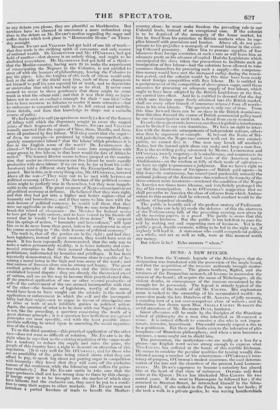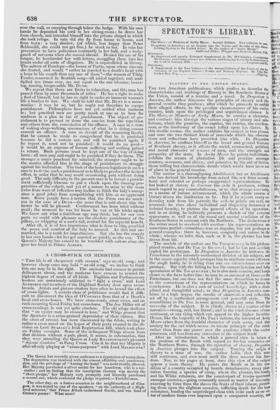DUNS : A NEW SPECIES.
\Vs: learn from the Teutonic legends of the Niebelungen, that the designation was transferred with the possession of the magic hoard, and that the acquisition of the treasure uniformly brought misfor- tune on its possessors. The giants brothers, Sigfrid, and the retainers of the Burgundian monarch, all become in succession the owners of the hoard ; all acquire the name of Niebelungen ; all die violent deaths, in consequence of the rancour occasioned by the struggle for its possession. The legend is strictly typical of the transmission of the wealth of' old Mr. COUTTS. His euphonious name is tacked to the ownership of his accumulated wealth : its possession made the late l)utchess of St. ALBANS, of jolly memory, a standing butt of a not over-scrupulous class of writers ; and its inheritance has drawn upon Miss A NI; El..1 COtTTS Braossrr the awful attentions of Mr. RICHARD Disx, barrister. Great allowance will be made by the disciples of the Shandean school of philosophy for a man who inherited so ill-omened a name. It is indeed difficult to conceive a that who is not impor- tunate, intrusive, impertinent. One could scarcely expect a dun to be a gentleman. But there are limits even to the toleration of phi- losophers—of Shandean philosophers; and when a man becomes a nuisance, a name ought not to shield hitn.
The persecution, the martyrdom—we arc really at a loss for a phrase—no English word seems strong enough to express what Miss Corrrs has suffered at the hands of' this terrible Irishman. Ile seems to combine the peculiar qualities for teasing usually dis- tributed among a number of his countryinen—O'Cornsmes inve- teracy of purpose, O'CoNamit's modest assurance, the cool determi- nation of the late and the aoarderie of the present Lord LONDON-. DERRY. Mr. Dests's eagerness to become a notoriety has placed hint at the head of that class of nuisances. OxFonn only fired twice at the Queen : DuNN has blockaded Miss COUTTS for two mortal years. If she went to Ilarrowgate he followed her ; if she returned to Stratton Street, he intrenehed himself in the Glou- cester Hotel ; if she walked in the Parks, he was at her heels; if she took a walk in a private garden, he was waving handkerchiefs over the wall, or creeping through below the hedge. With his own hands he deposited his card in her sitting-room ; he drove her from church, and intruded himself into the private chapel in which she took refuge. In vain did she fly from house to house, and from town : a very shadow, (of which, less happy than Peter Schlemild, site could not get free,) he stuck to her. In vain her precaution to have policemen constantly in her hall, and it body- guard of servants when she moved abroad. Denied the use of his tongue, he bombarded her with letters, smuggling them into her hands under all sorts of disguises. He is unparalleled in history. The suitors of Penelope—the lovers of Portia, upon whose absence she cleated, and would " rather be married to a death's head with a bone in his mouth than any one of them"—the wooers of Tibby Fowler, renowned in Scottish song—all added together, and mul- tiplied ten times over, arc not equal to the one irksome, haunt- ing, teasing, irrepressible Mr. DUNN. We repeat that there are limits to toleration, and this man has passed them by some thousands of miles.' He has a right to make a fool of himself, but he has no right to make an innocent woman's life a burden to her. We shall be told that Mr. DUNN is a mono- maniac : it may be so, but he ought not therefore to escape punishment. Philosophers have not yet settled what madness is ; but practical men are pretty much at one as to how far madness is a plea in bar of punishment. The object of pu- nishment is to prevent or deter the convict from the repetition and others from the commission of his offence. A man in a state of waking sleep-walking, unconscious of what he is doing, cannot commit an offence. A man so devoid of the reasoning faculty that he cannot be made to comprehend that lie is punished because lie did a certain act, and will be punished again if he repeat it, need not be punished : it would do no good— it would be an expense of human suffering and nothing gained in return. Such persons must be kept out of the way of doing harm : all men may and ought to be punished if they do harm. The stronger a man's penchant for mischief, the stronger ought to be the motive afforded hint in the shape of punishment to struggle against his inclination. The task of the humane legislator in such a case is to devise such a punishment as is likely to produce the desired effect, in order that he may avoid occasionieg pain without doing good. The only difficulty in the present case is to invent a punish- ment sufficiently irksome to put a check upon the dunning pro- pensities of the culprit, and yet of a nature to seem to the mass (who from want of reflection may incline to think the lady's annoy-
ance a good joke) front sympathizing with hint as an oppressed man. Some people have a notion that the Press can do much: not in the case of a DUNN—the more that is said about him the better he will be pleased. Confinement has been tried without avail ; the moment he was let loose he was at his tricks again. We know not what a fastidious age may think, but for our own parts we could with pleasure see the obsolete punishment of the pillory, or whipping at a cart's tail, revived for his especial benefit. After all, it is of less importance what is done to him, provided the peace and comfort of the lady be assured. As rich and un-
married, she is a mark for impertinence. lint she has the remedy in her own hands—let her get married as quickly as she can. The Queen's Majesty has ceased to be troubled with suitors since she gave her hand to Prince ALBERT.



























 Previous page
Previous page